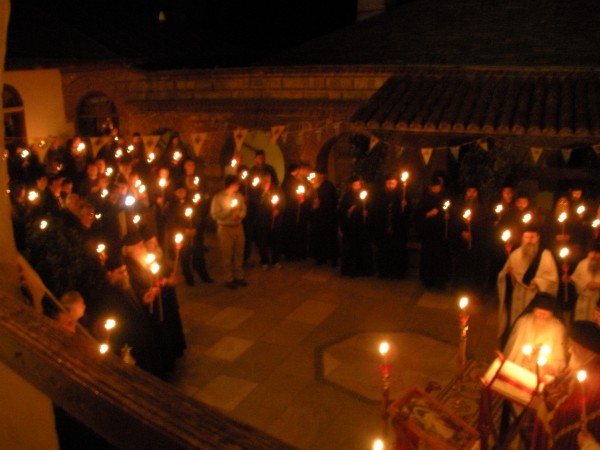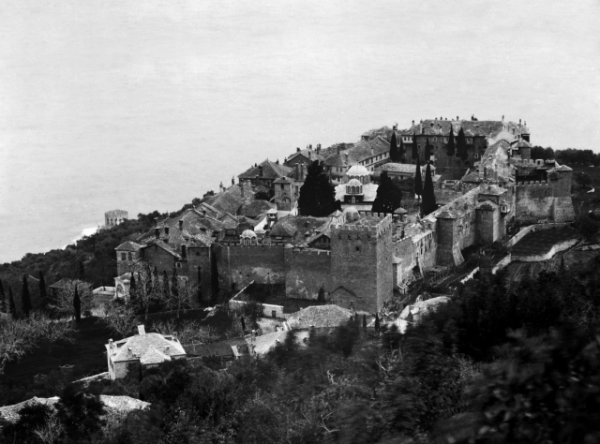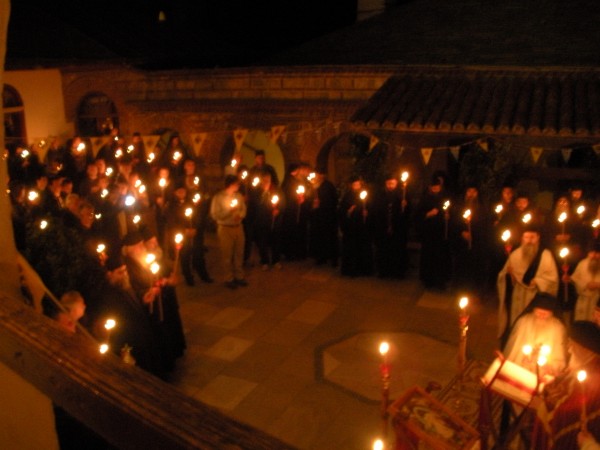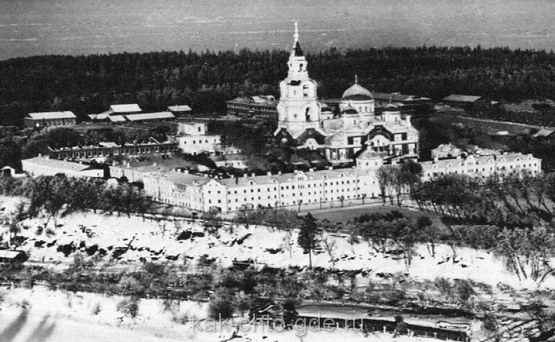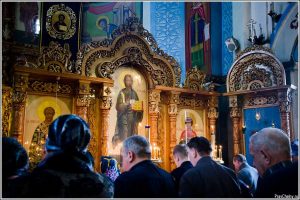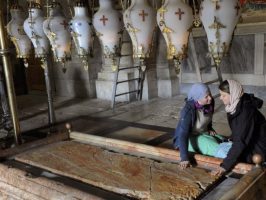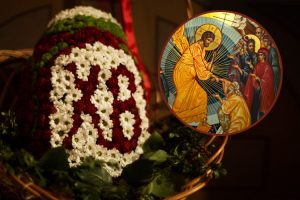Pascha on Mt. Athos
A description by Constantine Leontiev, a 19th century Russian intellectual and philosopher who was awakened spiritually by his exposure to the thousand-year-old monastic life on Mount Athos
The strict ascetical practices in most of the monasteries on Athos before the Paschal Festival reach such a point that it is frightening to think about it. Church services fill all day and all night. The taking of food is limited in the extreme. On certain days only the singers in the choir receive a piece of bread once or twice. During this time everyone on Athos must struggle with his body and spirit. When the Greeks greet one another at the commencement of the fast, they say: “I wish you success in swimming across the Lenten sea.” Indeed, the sea of hunger and sadness, of fatigue and forced prayer may not be foregone either by virtue of one’s own conscience or by the monastic regulations, except in cases of extreme exhaustion. In Passion Week the spiritual exertions of men for the glory of Christ and the honor of God become even more intense, the services longer, the food still more limited, the time for sleep and rest still shorter, and the examination of one’s conscience yet more merciless.
The last evening comes. Everywhere there is silence. The cells of the monks are closed; the corridors are quiet and the churches empty. The woods, the mountains, the sea–nowhere can human beings be seen. Then, exactly at midnight resound strong hammer strokes against a board. Suddenly the bells begin to ring powerfully and solemnly. Life springs into being. Doors bang and voices can be heard. Lights flicker everywhere. Illumined by hundreds of candles, the open churches glow. Everyone wakes up happy and full of joy. Even those who were most exhausted experience an inexplicable feeling of excitement. The swimming across the great sea of bodily privation and the sometimes almost unbearable struggles of the soul have ended. We have landed on a joyous, flowering shore. Christ is risen from the dead. He has conquered death through death. The Paschal Liturgy on Athos lasts from midnight till dawn. Then all the monks go for a time to their cells but come back for an early service.
Vespers is celebrated together with the Greeks in the largest church of the Russian Monastery of St. Panteleimon. This church is high, majestic, stern, dark arid at the same time blinding with gold. The iconostasis is very, very high. The church is completely filled with light. Besides a massive chandelier there is a giant silver ring with a row of candles that draw a garland of light around the pyramid-shaped lights of the chandelier.
Between the lights of the chandelier and the ring hang countless oil lamps and candles. On great feast days the chandelier and the ring rotate. All this blaze of candles and lamps, of gold and silver–blinds, gleams, sparkles and rotates as though silently rejoicing with the people in an unbroken, festal dance.
Then, the exclamation of the deacon:
That we may be worthy, to hear the Holy Gospel, let us pray to the Lord. The reading from the Gospel of St. John.
It is the Gospel in Greek· The reading has scarcely ended when suddenly there resounds a deafening ringing of bells …. Then a moment’s silence …. And in this sudden silence in the church, somewhere in the depths, we hear a strange but pleasant ringing sound as though large drops with musical tone were falling onto metal. The Greeks are striking with their small hammers against metal discs. And again silence.
Then an exclamation in Church Slavonic:
That we may be worthy to hear the Holy Gospel, let us pray to the Lord. The reading from the Gospel of St. John…
The priest reads in Slavonic. Again, the solemn ringing.., and once again the soft beating of the metal discs. Let us attend. The Gospel in Turkish. After renewed ringing
…once more the exclamation; Rome speaks:
Cum ergo sero esset die illo una sabbatorum~et fores essent clausae, ubi erant discipli …. (St. John 20:19)
Next I hear a language which I cannot understand. It is Albanian, the language of heros, terrible robbers and faithful servants.
Vespers ends. No more ringing is heard. In the paved court and along the long corridors between the monks’ cells again profound silence holds sway. For a long time I sit at the open window and look at sunny, golden, yellow, brown and white shrubs on the mountain side which is usually dark and bare but now seems to share our joy. I hear the soft tinkling of the bells on grazing donkeys. But other sounds overwhelm my soul on this evening: the exclamations and the ringing, the reading of the word of God, the different languages: Peace to you, Eirene humin, Pax vobiscum, Selam size.
The dark church, the stern appearance of the icons, the flashing gold and silver everywhere–the stillness, the ringing, the singing–and the wonderful reading to which everyone devoted the closest attention, interrupted only now and again by a smile of joy or an expression or mild surprise. And above our heads in the dark space, the silent, joyous, unceasing dance of countless lights. Truly. this is the Festival of Festivals !
Pascha on Valaam
Over a thousand years old, Valaam Monastery is situated on the islands of Lake Ladoga in northern Russia, not far from the Finnish border. In addition to the main monastery there were many small monastic communities (sketes) scattered about the islands. Closed by the communists in 1939, Valaam has since been turned into a museum by the Soviets.
Here in the words of a righteous monk Abbot Philemon, is a glimpse of how he remembered Pascha on Old Valaam
Hardly anywhere else in our Holy Russia was the feast of Pascha celebrated so humbly and quietly as on Valaam. We were left ourselves in the monastery, for no pilgrim could cross Lake Ladoga whose icy water were ferocious as at no other time of year Each skete had its own services. Only our (main) monastery, having spent the time of Great Lent in the usual labors, fasting an intensified prayer which began with everyone partaking of the Holy Mysteries (likewise o Passion week), would finally, unite on Holy Night in the basement church (of Sts. Sergius and Herman) in anticipation of the Light bearing Paschal Matins.
No one, of course, slept this night. The Acts of the Apostles was read; everyone who so desired took part. And there were man who crowded around the reading stand wanting to take a turn. Everyone would read a bit replacing one another. Twenty years in row I remember this service, and the preparations for it, the expectations and these solemn readings. How I also longed to read the Acts. And I would wait in line with the others, gradually nearing the sacred place But no! Every time something stopped me revealing the demon of vainglory. I didn’t have the courage, and so I never did read the Acts in the middle of the church in the Valaam Cathedral.
A fierce frost. Snow. Around us a wide strip of fragrant firs–darkening on the white path. Here the bannered procession will pass by; here it comes. Here and there bonfires, begin to flicker; they are made by our Finns, our monastery workers who love to light them in this day. Soon will burst forth our thousand-year-old Valaam singing, grand but simple, of the Paschal troparion–I can hear it now! The cathedral is lit with candles and sparkles with gold. The mighty Valaam bells burst out in solemn peals. And a long line of vested clergy shines with gold. The soul trembles and melts before this mighty splendor in glorification of the Risen God, by us poor and humble ones…
Unutterable was the feeling of contrition and awe in which I stood through this service, really going upstairs to the choir loft from here everything could be seen better. Only the last year, already in the rank of deacon, was in the altar–and I must admit, it some how hurt me to be too close to the awesome beauty of what was performed: I didn’t know where to stand, to whom to go for a blessing t order to get vested…I lost peace in trifles..,
The service was conducted at a brisk pace, everyone sang the canon, even the “simpletons.”
Then came the long line of congratulatory brethren, greeting one another with a triple kiss, all servers holding icons, headed by the abbot. Everyone exchanges the Paschal embrace with a kiss. Hundreds, over a thousand monks line up. The first to greet you with “Christ is risen!” is the abbot, while his cell-attendant hands you an egg, and then all the brethren.
Liturgy is conducted strictly, according the typicon, but at a quick pace, joyous and light. There’s scarcely time to take it in before it is all over. Then everybody goes to the refectory to break the fast, solemnly following the abbot in pairs according rank, carrying the holy artos , [A special bread with a cross signifying Christ as the Heavenly Bread (John 6:33)] the singers preceded by those carrying the banners–and it is during the entire week. On the tables there is a second egg for everyone (these are the only eggs the Valaam monk sees during the entire year), kulich and cheese pascha-but not very much; the Valaam monk’s fast is strict, and even on the Great Feast of Pascha, he consoles himself with little.
Day breaks–the light-bearing Resurrection of Christ! On Valaam it is very special –we are all alone! And everyone is left to himself. The pealing of bells is uninterrupted; everyone is welcome to go and ring. But even here, not once did I make it to the belfry.
I was drawn rather into the expansive wilds of nature, hastening to visit all around –what beauty, what grace abounded! Once you came out to the shore of the lake, you held your breath upon beholding the grandeur of the breaking ice on the wide surface of the lake. And how apparent here was the feeling of our solitude! our being cut off from the world. Then I’d visit all the chapels; there were many of them scattered about. There we’d sing “Christ is risen”, either together with someone else, or alone. Besides ourselves, the brethren, there was no one anywhere.
This state of freedom was so unusual! There was no need to hurry anywhere, to rush; one was not afraid to be late to some obedience, or to miss anything. There was only one day like this in the whole year, long and full, lasting without end–you can go everywhere, wherever you want, and you feast on it endlessly, wandering and walking to your heart’s content, the soul rejoicing.
At approximately 3 o’clock, a bell is rung, its peculiar short rings calling everyone to tea. At this time many come from the sketes also. Tea is served with milk: three pieces of lump sugar, bread, sweet bread–eat, drink as much as you want.
For the next several days the service is conducted in various churches; the Risen Lord must be glorified everywhere. The service on the third day after Pascha is held in the upper church of the Cathedral. [This church was used only in summer and was unheated.] Everyone dresses as warmly as possible. Clouds of vapor rise from the mouths of the singers. I don’t know how the Holy Gifts do not freeze–it’s so terribly cold ! But the Paschal service proceeds very briskly.
Oh, that Light-bearing joy of Valaam! Oh, that holy Russian simplicity, the thousand-year-old austere simplicity, faithful to its poverty and humility, and magnificent in its triumphant celebration of the Resurrected Christ !
Monk Herman
Pascha 1974












